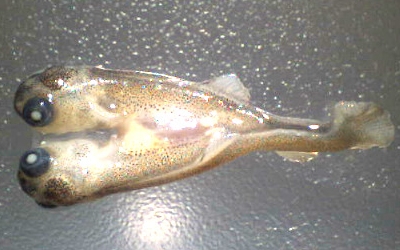Front Porch Blog

A two-headed trout deformed by selenium pollution.
Last week a federal judge upheld a previous decision requiring a Virginia coal company to get a permit for their discharges of toxic selenium.
Selenium is a mineral that is extremely toxic to fish and other aquatic life at very low levels. It is commonly discharged from many coal mines and coal ash ponds. Even in small amounts, selenium causes deformities, reproductive failure and even death in fish and birds. Even though its toxic effects and prevalence in coal mine discharges are well known, this is the first mine in Virginia that will be required to monitor and obtain a permit for its selenium discharges.
Water testing done by Southern Appalachian Mountain Stewards (SAMS) revealed that A&G Coal Corporation’s Kelly Branch Surface Mine was discharging selenium in toxic amounts. So in 2012, Appalachian Voices, SAMS and the Sierra Club, represented by Appalachian Mountain Advocates filed suit against A&G for illegal discharges of selenium.
A&G Coal Company is owned by billionaire, frequent political campaign contributor and coal baron James Justice.
Last year, a federal judge ruled in our favor and ordered A&G to begin daily selenium monitoring and to apply for a permit from the Commonwealth of Virginia to cover its selenium discharges. A&G appealed that decision with the support of a number of industry groups including the National Mining Association, the Virginia Coal and Energy Alliance, the Virginia Mining Association, the Virginia Mining Issues Group, the American Petroleum Institute and several others. That appeal failed last week.
A&G claimed that their current water discharge permit provided them a “permit shield.” Basically, since they were meeting the terms of their current permit, they were shielded from any liability for other water pollution not included in that permit.
In his decision federal district judge James P. Jones disagreed. The decision states that the validity of a “permit shield” is a two-prong test, requiring that a permittee disclose the presence of the pollutant in its permit application, and that the state agency considers that pollutant. If you fail one prong then you lose the shield. In this case A&G never disclosed the presence of selenium in their permit application, and there is no evidence that Virginia considered selenium pollution, so the company failed both parts of the test. The decision concludes:
To allow the [permit shield] defense in these circumstances would tear a large hole in the [Clean Water Act], whose purpose it is to protect the waters of Appalachia and the nation and their healthfulness, wildlife, and natural beauty.
PREVIOUS
NEXT
Related News

Leave a comment
Your email address will not be published. Required fields are marked *
